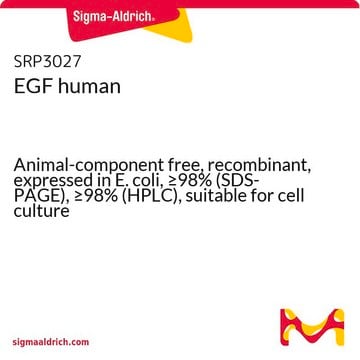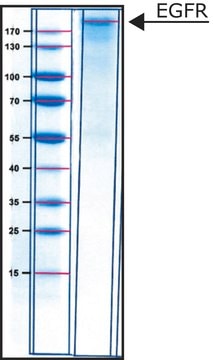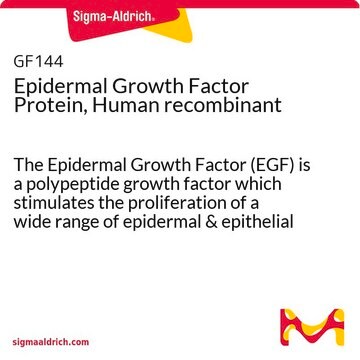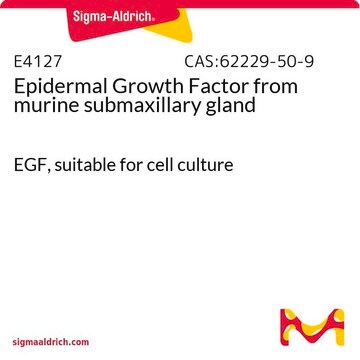E3641
Epidermal Growth Factor Receptor human
buffered aqueous glycerol solution, 5,000-30,000 units/mg protein (Lowry)
Synonym(s):
EGFR
Sign Into View Organizational & Contract Pricing
All Photos(2)
About This Item
Recommended Products
biological source
human
Quality Level
form
buffered aqueous glycerol solution
potency
5000.00-30000.00 units/mg
specific activity
5,000-30,000 units/mg protein (Lowry)
mol wt
~170 kDa
packaging
pkg of 500UN
storage condition
avoid repeated freeze/thaw cycles
color
colorless
UniProt accession no.
shipped in
dry ice
storage temp.
−70°C
Gene Information
human ... EGFR(1956)
Looking for similar products? Visit Product Comparison Guide
General description
Affinity purified from human carcinoma A431 cells.
Epidermal growth factor receptor (EGFR) belongs to a family of cell surface receptors called receptor tyrosine kinases (RTKs), and is also the most studied member of this family. It is made up of an ectodomain (ECD), which contains four subdomains called DI-DIV, a transmembrane region, and a cytoplasmic tyrosine kinase domain (TKD). Binding of the ligand induces conformational changes in the ECD, which leads to the dimerization of EGFR. This results in the activation of the TKD, and the subsequent signal transduction. This receptor has a molecular weight of ∼178kDa.
Epidermal growth factor receptor (EGFR) belongs to a family of cell surface receptors called receptor tyrosine kinases (RTKs), and is also the most studied member of this family. It is made up of an ectodomain (ECD), which contains four subdomains called DI-DIV, a transmembrane region, and a cytoplasmic tyrosine kinase domain (TKD). Binding of the ligand induces conformational changes in the ECD, which leads to the dimerization of EGFR. This results in the activation of the TKD, and the subsequent signal transduction. This receptor has a molecular weight of ∼178kDa.
Biochem/physiol Actions
EGF exerts its actions by binding to the EGF receptor (EGFR), a 170 kDa glycoprotein having EGF-activated protein tyrosine kinase activity. Even in the absence of EGF-like ligands, EGFR can participate in cellular responses elicited by several other stimuli. High levels of EGFR are expressed in approximately one third of human epithelial tumors, and in the cancers of the bladder, breast or lung that have poor clinical prognosis, hence the interest in targeting EGFR.
Epidermal growth factor receptor (EGFR) has an essential role in normal developmental processes, and is mutated in multiple cancers. It is involved in the pathogenesis of epidermoid tumors, and thus, has extreme importance as a cancer therapeutic target. Gefitinib (GEF) and erlotinib act as EGFR inhibitors, and induce apoptosis in non-small cell lung cancer (NSCLC) cells. A truncated isoform, called EGFRvIII is linked to multiple cases of head and neck squamous cell carcinoma (HNSCC). In ~40% of glioblastoma multiforme (GBM), this gene is amplified.
Unit Definition
One unit (U) of the enzyme is defined as the amount needed to incorporate 1 pmol of phosphate into the substrate (KVEKIGEGTYGVVYK: 6 - 20 residue of p34cdc2) in 1 minute.
Physical form
Solution in 50% glycerol, containing 50 mM HEPES, pH 7.6, 150 mM NaCl, 0.1% Triton and 1 mM dithiothreitol
related product
Product No.
Description
Pricing
Storage Class Code
10 - Combustible liquids
WGK
WGK 2
Flash Point(F)
Not applicable
Flash Point(C)
Not applicable
Choose from one of the most recent versions:
Already Own This Product?
Find documentation for the products that you have recently purchased in the Document Library.
Customers Also Viewed
Sarah E Wheeler et al.
PloS one, 10(2), e0117781-e0117781 (2015-02-07)
Head and neck squamous cell carcinoma (HNSCC) accounts for more than 5% of all cancers worldwide. The mortality rate of HNSCC has remained unchanged (approximately 50%) over the last few decades. Ubiquitous overexpression of wild type EGFR in many solid
Shohei Sugita et al.
Biochemical and biophysical research communications, 461(1), 28-34 (2015-04-11)
Gefitinib (GEF), an inhibitor for EGFR tyrosine kinase, potently induces autophagy in non-small cell lung cancer (NSCLC) cell lines such as PC-9 cells expressing constitutively activated EGFR kinase by EGFR gene mutation as well as A549 and H226 cells with
Karol Kaszuba et al.
Proceedings of the National Academy of Sciences of the United States of America, 112(14), 4334-4339 (2015-03-26)
The epidermal growth factor receptor (EGFR) regulates several critical cellular processes and is an important target for cancer therapy. In lieu of a crystallographic structure of the complete receptor, atomistic molecular dynamics (MD) simulations have recently shown that they can
Nicholas J Bessman et al.
Cell reports, 9(4), 1306-1317 (2014-12-03)
The epidermal growth factor receptor (EGFR) plays pivotal roles in development and is mutated or overexpressed in several cancers. Despite recent advances, the complex allosteric regulation of EGFR remains incompletely understood. Through efforts to understand why the negative cooperativity observed
Kristen J Champion et al.
Cancer research, 68(12), 4649-4657 (2008-06-19)
von Hippel-Lindau (VHL) disease results from germline and somatic mutations in the VHL tumor suppressor gene and is characterized by highly vascularized tumors. VHL mutations lead to stabilization of hypoxia-inducible factor (HIF), which up-regulates proangiogenic factors such as vascular endothelial
Our team of scientists has experience in all areas of research including Life Science, Material Science, Chemical Synthesis, Chromatography, Analytical and many others.
Contact Technical Service






